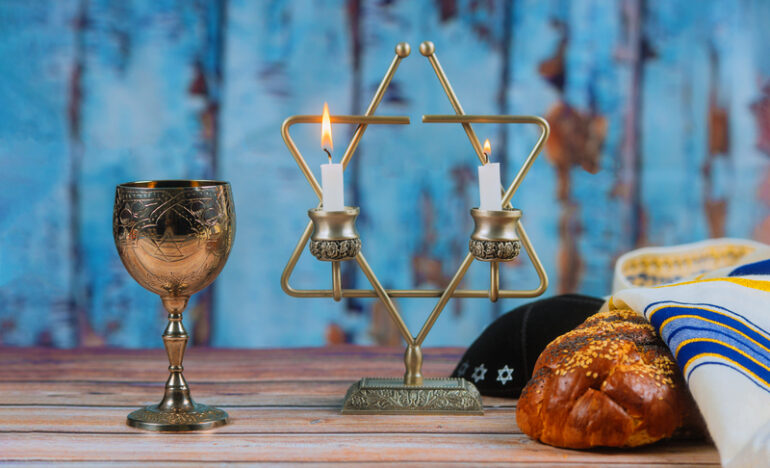The Jewish Holiday of Shabbat: A Weekly Time of Refreshment

By Kathy Keary
Our full series on Contemplative Life is here.
Our new series on Judaism and Contemplation is here.
Rabbi Ted Falcon states that Jewish holidays are not only fun but may be the ideal way to uncover the heart of Judaism. He describes the “peaceful oasis” of Shabbat as “the one day each week that observant Jews stop working, traveling, building, and fussing, and they instead ask themselves ‘Am I a human doing, or a human being?’” It is a day to just be and relish the beauty of the world.
Shabbat begins at sunset each Friday and continues until darkness falls on Saturday. It’s a sacred time to study, reflect on the deeper meaning and values of life, sing, savor silence, be with family and the faith community, take leisurely walks, play games, attend lectures or study groups, and refresh one’s body and one’s soul. Falcon elaborates: “The sages describe it as a taste of the world to come – a glimpse into the Messianic time of true peace and lovingkindness” (Falcon, 239, 240, 243).
The website, My Jewish Learning, states that Shabbat is mentioned 80 times in the Torah, but only a few of these passages describe how to observe this holy day and only two of them explain the rationale for doing so. Genesis tells us that on the 7th day, God had completed the work he was doing, so he blessed this day and declared it holy (Genesis 2:2-3). The Book of Exodus reveals that God included in the Ten Commandments a mandate to “remember the Sabbath and keep it holy” (Exodus 20:8). Shabbat is observed in imitation of the Creator.
In the Book of Deuteronomy, God instructed: “Remember that you were a slave in the land of Egypt and the Lord your God freed you from there with a mighty hand and an outstretched arm; therefore, the Lord your God has commanded you to observe Shabbat” (Deuteronomy 5:15). This calls to mind the covenant between God and the Jewish people. In return for freeing the Israelites from slavery, the people were required to keep God’s commandments. It also commemorates the redeemed status of the Jewish people and serves as a way to remember their enslaved ancestors who were denied days of rest as well as those who are still unjustly enslaved today (My Jewish Learning).
The Jewish mystics, known as the Kabbalist, offer an interesting motivation for the practice of Shabbat. The Kabbalist believe that what happens to someone in their personal life reflects what is also happening on a larger scale in the universe. They also believe what is happening on the cosmic level effects each person’s life.
Inspired by the creation story, the Kabbalist spend the first six days of the week engaged in the world affecting change as they relate with people and things in their environment. On the seventh day, they aspire to allow the cosmos to be the active agent in the relationship. They refrain from their routines in order to become full participants in the cosmic wedding – the union between God and creation. We refer you to the article, “Understanding Shabbat as a Spiritual Practice” for more information on this intriguing perspective (Reclaiming Judaism).
Note: Never miss an article published on the Renewal Center website: Sign up to receive our newsletters.
Falcon eloquently describes Shabbat as a special guest who arrives on Friday evening and stays until nightfall on Saturday:
The guest is so full of grace and light, so loved and so loving, that to have her arrive is a pleasure and to see her leave brings sadness. In the Talmud, the rabbis personified Shabbat as a beautiful bride, a partner for the Jewish people, who they would greet with joy each week.
Just as we take special measures when we are expecting company, Jewish families also prepare for Shabbat. Many families make sure the house is spic and span, use the best china, cook an elaborate dinner, and dress up.
A candle-lighting ritual with a blessing immediately precedes the celebration of Shabbat in the home. Four other blessings follow: a blessing over the children, the wine, the washing of hands, and the bread. Families also take a moment prior to dinner to welcome Shekhinah, the Divine Presence and sing the song Shalom Aleikhem (“Peace to You”).
Much symbolism is in play at the Shabbat meal. The candlelight represents the great love that fills the air on this holy night that awakens the mind. Wine or juice is shared representing the love that awakens the heart. A special bread is served signifying the love that awakens in and through the body (Falcon, 243).
Prior to eating, many Jews engage in a simple hand washing ritual as they pray these words: “Blessed are You, Eternal One Our God, Universal Ruling Presence, Who sanctifies us with Mitzvot [path of holiness] and give us the mitzvah of washing the hands” (Falcon, 247).
There is so much more to be said about Shabbat. Next week we will return to this joyous weekly holiday that is enriched with family, community, prayer, tradition, and profound symbolism. In the meantime, we refer you to our article, “Sabbath Thinking: Rest for the Soul,” written from a Christian perspective.
References
Falcon, Ted and Blatner, David. Judaism for Dummies. Hoboken, New Jersey: John Wiley and Sons, Inc, 2019.
Milgram, Rabbi Goldie, “Understanding Shabbat as a Spiritual Practice.” Reclaiming Judaism. www.reclaimingjudaism.org/teachings/understanding-shabbat-spiritual-practice
“The Significance of Shabbat.” My Jewish Learning. https://myjewishlearning.com/article/shabbat-themes-and-theology
Photo 155653322 © Photovs | Dreamstime.com
Kathy Keary, a Precious Blood Companion and spiritual director, holds a Master’s Degree in Theological Studies and is a graduate of the Atchison Benedictines Sophia Center’s Souljourners Program, an intense study of spirituality and spiritual direction. Kathy believes that the Divine is present and active in all of life and encourages others to be awakened to the God in all including the divine within. She enjoys accompanying others on their journey to wholeness discovering the person they were created to be.
We’d Like to Hear from You!
We’d like to know what you think about this article. Send us a comment using the form below. Do you have a suggestion? Is there something you want to learn more about? Send us a note.
Related

Take Nothing for the Journey
An Assembling God’s Puzzle video
By Fr. Garry Richmeier, C.PP.S.
Jesus’ teaching about what to take on a journey — nothing — is actually good advice for building trusting relationships. Don’t bring your “stuff” into the relationship; listen deeply and respec their views and situation, understand their struggles.

Pilgrims of Hope, Episode 6: Walking with Cancer Survivors
Hosted by Fr. Ron Will, C.PP.S.
We are talking with people who find hope amid difficult circumstances or bring hope to others. In this episode, Kathy Keary talks about how centering prayer, journaling and other spiritual practices helped her cope with two life threatening health issues.
Categories
Assembling God's Puzzle Coffee with Padre Cooking & Spirituality Encounters of the 4th Kind Family Matters Reflections on the Eucharsitic Prayers Spiritual Resources Taize Prayers The Contemplative Life Traveling with Pilgrims of Hope Uncategorized Videos Week of Prayer for Uhristian Unity When you need a little help
